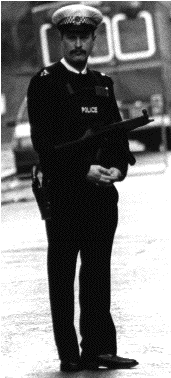

10/9/99
9:59 PM BST

A free country?The City of London is now surrounded by roadblocks, armed police checkpoints and surveillance cameras. Anybody passing in or out of the City is liable to be stopped, searched and have their movements recorded. This restriction on our movements in our own capital city marks another stage in the erosion of freedoms in Britain today. The government has used the IRA as the pretext for introducing its armed checkpoints. It employs the magic word 'terrorism' to scare people into accepting what was previously unacceptable. But the crackdown in the City has nothing to do with Ireland. It is part of a pattern of increasing state control over every aspect of British society: the new authoritarianism. On the pages that follow, Living Marxism reports on just some of the new coercive legal measures which are now being proposed and introduced around the country, by everybody from a royal commission to Hackney council and South Yorkshire police. There are many more recent examples, like the new midnight 'Cinderella' curfew on Glasgow nightclubs, of the authorities taking our liberties. Of course, the authorities claim that all of these measures are for our own good. They argue that only criminals or those with something to hide would protest. That has been the cry of every tinpot dictatorship and police state down the ages. Suppose we were to accept that surveillance cameras and checkpoints were justified as part of an anti-crime campaign; where will it end? After all, the same argument can be used to justify just about any measure of state control: compulsory identity cards, universal finger-printing (and genetic finger-printing), the tapping of all phone-calls, restrictions on foreign travel.... London already has Belfast-style armed roadblocks. What is to stop the police claiming next that they need a computerised intelligence system on the Northern Ireland model, where they know what colour wallpaper you have in your living room, how many pints of milk you get delivered, and who stayed at your house last night? It might sound fair enough for the authorities to say that only criminals need fear the new measures and controls. But who decides what is a crime and who is a criminal? The same government ministers, police chiefs and judges who set up the roadblocks, install the surveillance cameras and issue the injunctions. The concept of crime is constructed by the state authorities, and defined in whatever way might suit their purposes. Today they are continually broadening the definition of criminality, extending the law into every corner of society. The effect is to put more people and more activities on the wrong side of the law, and so expose them to measures of state control. For example, recent proposals to strengthen public order legislation would make many music raves illegal without police permission. A whole generation of party-goers would be turned into criminals overnight. And what about the government proposal to restrict the right of unmarried mothers to welfare and housing benefits, and subject them to even more interference from state agencies? In effect, this means that the authorities are to treat working class women who dare to bring up children outside the confines of holy matrimony as offenders, to be punished and kept under surveillance. On the same weekend in July that the City was taken over by the police, 37 people were arrested protesting against the M3 motorway extension at Twyford Down. The courts had earlier banned them from taking part in any such action. When legitimate and moderate protests like this are criminalised, the dangers of accepting the case for extending the state's repressive powers ought to become clearer. It is ironic that so many people seem prepared to acquiesce in the granting of extra powers to the government, the police and the courts at a time when these institutions have been thoroughly exposed as incompetent, corrupt, and hostile to ordinary people. Surely we ought to be challenging the state's creeping infringements of civil rights, not encouraging the authorities to give themselves yet more power to order us about? Exposing and opposing the new authoritarianism is a matter of some urgency. The time to take a stand is now, before everybody becomes complacent about the law and order drive, and armed checkpoints, surveillance cameras and all the other state intrusions into our private affairs become accepted as an everyday part of the British way of life. Armed police weren't the only high-profile presence on the streets of London in early July The Campaign Against Militarism also made headline news with its 'Open the roads, close the checkpoints' protests (below) 
Reproduced from Living Marxism issue 58, August 1993 |
|
http://www.informinc.co.uk/LM/LM58/LM58_Autho.html |
Mail: webmaster@mail.informinc.co.uk